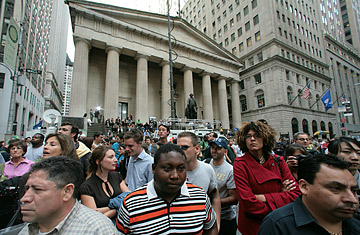
The presence of news media attract scores of onlookers in front of Federal Hall during coverage of the nearby New York Stock Exchange on Sept. 30
On Monday the House of Representatives saved us from the greedy fingers of Wall Street. Rather than surrender a single nickel of taxpayer money to the mob that gave us Alt-A mortgages, collateralized debt obligations (CDOs) and credit-default swaps, the House voted down the big bailout. Mr. Market was a very unhappy camper, dropping 777 points and change — or $1.2 trillion in market value. "This is a huge cow patty with a piece of marshmallow stuck in the middle of it, and I am not going to eat that cow patty," vowed Representative Paul Broun, Republican of Georgia.
There's just one problem, Congressman Cow Patty: A lot of us did eat it, including many of your constituents. The $1.2 trillion — let's spell that out as $1,200,000,000,000 — that disappeared from the stock market on Monday didn't go down a black hole in lower Manhattan. It came out of America's 401(k)s, mutual funds, pension funds and personal portfolios. We've got $17.6 trillion in retirement assets invested as of 2007. There is some $12 trillion invested in mutual funds alone (well, at least before yesterday); about 44% of all U.S. households hold these accounts, according to the Investment Company Institute.
Let's take a different look at that beating on the Dow. Turn the $1.2 trillion into a gain (say, by passing a bailout law that actually loosens stuck gears of credit) and the long-term capital gains tax on it is $180 billion, which could buy a lot of crap CDOs. And then perhaps resell them at a profit. If we take that $1.2 trillion as a loss, the government foregoes tax money, because taxpayers will report lower incomes after they write off investment losses. Revenues drop, so the government then has to keep priming the pump by increasing spending, which will really tick off Representative Broun.
Then consider the wealth effect, much debated but empirically documented, which suggests that every dollar of increased household wealth will, over a period of time, convert to 3 to 5 cents of spending. Calculators, please: 0.03 times $1.2 trillion equals $3.6 billion in spending. In an economy that is two-thirds consumer spending, that's another growth driver. One other thing about the wealth effect is that it works splendidly in reverse too. There's the prospect that Broun and his colleagues could be serving up a double whammy to households across the country: declining stock market wealth in addition to already plummeting housing wealth.
Some of the homeowners who are losing wealth reside in Clarke County, Ga., Congressman Broun's home turf, which also had $1.9 billion in deposits in financial institutions in 2006, according to the University of Georgia. That ain't chicken feed. And speaking of which, the fourth largest employer in the region, poultry processor Pilgrim's Pride, is now struggling with financing because credit markets have seized. There are 1,500 jobs in the balance if, say, Pilgrim's Pride can't make payroll because it doesn't have access to funds. It is unlikely that any of those workers invested in CDOs. It is certainly possible that some of them are in over their heads on subprime loans. Some 63% of Georgia's subprime loans were late over the past 12 months; 6.2% are in foreclosure, according to the Federal Reserve.
Could any of them be helped by the bailout bill? Possibly. Do they deserve it? Good question.
The market today gave legislators the opportunity for a do-over, rising nearly 5% on the notion that all those folks who were sending angry messages to their Representatives might have a doubt or two after checking their mutual funds balances. Broun is resolute that taxpayer money won't be used "to give a golden parachute to Wall Street that our grandchildren may still be paying for many decades from now." But Wall Street is all of us, including the Congressman from the 10th District in Georgia. We are all going to eat the cow patty. The only question is, how big will it be?
(See the ten steps to the financial meltdown here and TIME's photos of the global financial crisis here.)
